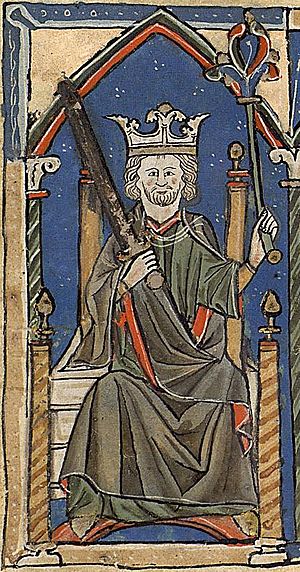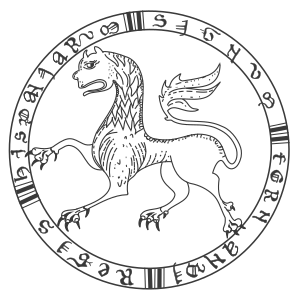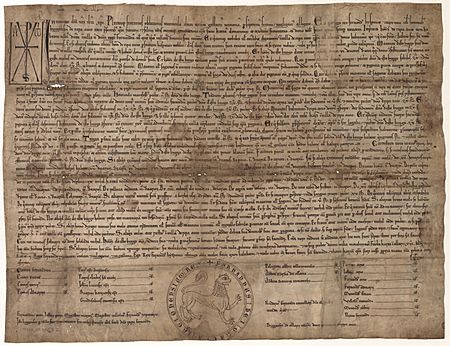Ferdinand II of León facts for kids
Quick facts for kids Ferdinand II |
|
|---|---|
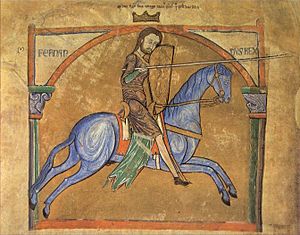
Ferdinand II in miniature of the Tumbo A of Santiago de Compostela Cathedral
|
|
| King of León and Galicia | |
| Reign | 21 August 1157 – 22 January 1188 |
| Predecessor | Alfonso VII |
| Successor | Alfonso IX |
| Born | c. 1137 |
| Died | 22 January 1188 (aged 50–51) Benavente |
| Burial | Cathedral of Santiago de Compostela |
| Spouse |
|
| Issue among others... |
Alfonso IX |
| House | Castilian House of Ivrea |
| Father | Alfonso VII of León and Castile |
| Mother | Berenguela of Barcelona |
Ferdinand II (born around 1137 – died 22 January 1188) was a king from the House of Ivrea. He ruled as King of León and Galicia from 1157 until his death. He was known for his skills as a knight and for expanding his kingdom's territory.
Contents
Life of King Ferdinand II
His Family and Early Life
Ferdinand was born in Toledo, Castile. He was the second surviving son of King Alfonso VII of León and Castile and Berenguela of Barcelona. His older brother was Sancho III of Castile, who later became King of Castile.
Ferdinand's education was overseen by a nobleman named Count Fernando Pérez de Traba. From a young age, Ferdinand was involved in government duties. By 1151, his father began to include him in royal documents, sometimes calling him "King of Galicia." He was surrounded by important nobles from León and Galicia.
In 1155, King Alfonso VII decided to divide his lands among his sons. Ferdinand was given the Kingdoms of León and Galicia. People knew Ferdinand as a brave knight and a strong fighter.
Becoming King and First Marriage
In 1157, his father, King Alfonso VII, passed away. Ferdinand became King of León and Galicia, as planned. Early in his rule, he had to deal with powerful local nobles. He also faced an invasion from his brother, Sancho III of Castile.
In 1158, Ferdinand II and his brother Sancho III signed the Treaty of Sahagún. They agreed to fight against the Muslim rulers in southern Spain together. They also planned to divide any lands they conquered. However, Sancho III died the same year, and his young son Alfonso VIII became king. This changed the plans of the treaty.
During Alfonso VIII's childhood, two powerful families, the Lara and Castro, fought to control the young king. Ferdinand II used this chance to invade Castile. He wanted to take care of his nephew, Alfonso VIII, and bring order back to the kingdom.
In 1165, Ferdinand II married Infanta Urraca of Portugal. She was the daughter of King Afonso I of Portugal. This marriage helped bring peace and an alliance between León and Portugal. Ferdinand also helped rebuild and repopulate cities like Ledesma and Ciudad Rodrigo.
Wars and Conflicts
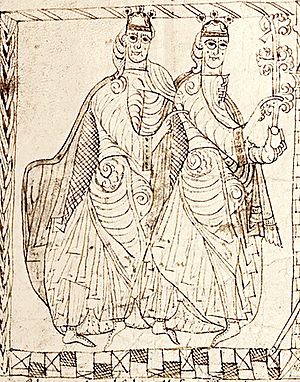
In 1162, Ferdinand II captured the city of Toledo from Castile. He appointed Fernando Rodríguez de Castro as its governor. Toledo stayed under Leonese control until 1166. In 1162, Ferdinand also signed an agreement with Alfonso II of Aragon, called the Treaty of Ágreda.
In 1164, Ferdinand's forces, led by Fernando Rodríguez de Castro, defeated the Lara family in the Battle of Huete. Ferdinand also worked with the Lara family to give the city of Uclés to the Knights Templar. This was to help defend Toledo from the Muslim Almohads. Ferdinand then focused on fighting the Almohads himself, taking cities like Alcántara and Albuquerque.
Even with his marriage to Urraca, conflicts with Portugal continued. Between 1166 and 1168, King Afonso I of Portugal took several Leonese cities. Ferdinand II strengthened Ciudad Rodrigo. Afonso I, thinking Ferdinand was preparing to attack, sent his son, Infante Sancho of Portugal, to attack Ciudad Rodrigo. Ferdinand came to help and defeated the Portuguese troops.
Afonso I then invaded Galicia. In 1169, he attacked Cáceres and also laid siege to Badajoz, which was held by Muslim forces. Ferdinand II quickly moved his army to Badajoz. King Afonso I tried to escape but broke his leg and was captured by Ferdinand's men.
As ransom, Afonso I had to give back most of the lands he had taken in Galicia. In a peace treaty signed in Pontevedra, Ferdinand II regained many castles and cities, including Cáceres and Badajoz. Later, when the Almoravids attacked the Portuguese city of Santarém, Ferdinand II helped his father-in-law defend it.
In 1170, Ferdinand II created the Order of Santiago de Compostela. This was a military-religious order of knights. Their job was to protect the city of Cáceres and pilgrims traveling to the tomb of Saint James.
Later Marriages and Peace Efforts
In 1175, Pope Alexander III canceled Ferdinand II's marriage to Urraca of Portugal. The reason was that they were too closely related (second cousins). This happened even though they had a son, Alfonso, who was born in 1171.
After 1177, Ferdinand II married Teresa Fernández de Traba. She was the daughter of his former tutor, Count Fernando Pérez de Traba. This marriage helped strengthen his ties with powerful noble families.
In 1178, Ferdinand II invaded Castile again, taking some towns. The Castilian king, Alfonso VIII, allied with Afonso I of Portugal against him. In 1180, Ferdinand II and Alfonso VIII met in Tordesillas and agreed to a peace treaty. Sadly, Ferdinand's second wife, Teresa, died in 1180 while giving birth to their second son. Both were buried in the Royal Pantheon of the Kings of San Isidoro of León.
Organizing the Kingdom
Ferdinand II gave special laws, called cartas forales, to many cities and towns. These laws helped them grow and develop. Some of these cities included Padrón, Ribadavia, Noia, Pontevedra, and Lugo. He also supported many monasteries.
During his reign, the Order of Santiago was founded. In 1181, Pope Alexander III granted the special Jubilee holy year to the Santiago de Compostela Cathedral. This encouraged many pilgrims to visit, which helped the economy and culture of the areas along the Camino de Santiago.
Final Years and Death
In 1184, the Almohad caliph Abu Yaqub Yusuf invaded Portugal and besieged King Afonso I in Santarém. Ferdinand II sent his armies to help his father-in-law, and they successfully freed the city.
In May 1187, Ferdinand II married Urraca López de Haro. She had been his mistress for several years. Queen Urraca wanted her own son, Infante Sancho, to become king instead of Ferdinand's first son, Infante Alfonso. She claimed Alfonso was not a rightful heir because his parents' marriage had been annulled. Ferdinand II banished Infante Alfonso for a time, which was a victory for Urraca.
Ferdinand II died on 22 January 1188, at the age of 51, in Benavente. He was returning from a pilgrimage to Santiago de Compostela. His eldest son, Alfonso IX of León, became the next king.
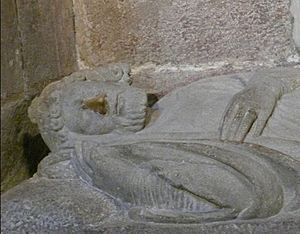
Ferdinand II had wanted to be buried in the Santiago de Compostela Cathedral. However, his widow, Queen Urraca, did not want his body moved there at first. This was because the Archbishop of Santiago was a supporter of King Alfonso IX.
Later, his son Alfonso IX ordered that Ferdinand's remains be moved to Santiago de Compostela Cathedral. This was to honor his father's last wishes. Ferdinand II was buried there next to his mother and grandfather. His tomb is in the Chapel of the Relics in the cathedral. The statue on his tomb shows him dressed in royal clothes, with a crown on his head.
His Children
Ferdinand II had children with his three wives:
- With his first wife, Urraca of Portugal, he had one son:
- Alfonso IX (born 1171 – died 1230), who became the next King of León and Galicia.
- With his second wife, Teresa Fernández de Traba, he had two sons:
- Ferdinand (born 1178 – died 1187), who died as a child.
- Sancho (born and died 1180), who died at birth, along with his mother.
- With his third wife, Urraca López de Haro, he had three sons:
- García Fernández (born 1182 – died 1184), who died young.
- Alfonso Fernández (born 1184 – died 1188), who died before his father.
- Sancho Fernández (born 1186 – died 1220), who became a lord and served his half-brother King Alfonso IX.
See also
 In Spanish: Fernando II de León para niños
In Spanish: Fernando II de León para niños
 | Tommie Smith |
 | Simone Manuel |
 | Shani Davis |
 | Simone Biles |
 | Alice Coachman |


